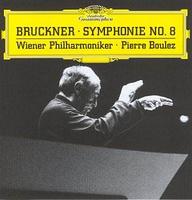Bruckner: Symphony no 8 by Pierre Boulez


Bruckner: Symphony no 8 in C minor (Nowak edition)
Wiener Philharmoniker
Conductor: Pierre Boulez
Label: Deutche Grammophon/ TDK (DVD)
Recommendations: Horenstein/LSO (BBC), Guilini/VPO (DG), Maazel/BPO (EMI)
This recording was from live International Bruckner Festival at 1996, commemorating the birth of Austrian symphonist Anton Bruckner. A modernist and contemporary conductor handling one of the greatest symphonies in Late Romantic Austro-German repertoire is as queer as Toscanini attempting HIP Beethoven. Maestro Boulez was no stranger to controversy. You need to look back his debut at Bayreuth Festival performing under Chéreau s direction Wagner's Ring cycle at 1980. The reception was very hostile and reports were heard from the whole show performing without audiences, booes almost closed the opening night premiere and even death threats. At 1996, thankfully there was only skepticism but after the performance and eventual release of the CD, superlative acclaims were plenty. Many claimed the recording the finest alongside other VPO recordings by Karajan and Guilini. In fact, I don't think I have yet to find a critic who didn't like the recording.
I have to admit not listening to the CD and watched the DVD instead. Interestingly in an exclusive bonus interview, Boulez wasn't particularly interested in historical significance of the work and the background especially concerning rural Austria where Bruckner grew up and the biographical meaning of work to the composer. However he did share his views which was commonly perceived with the Scherzo that the continuous heaving rhythm is synonymous with daily labour of farmers in Austrian countryside. As usual with Boulez, he seeks to dispel the work's sentimentality and it's kisch. In fact this is an analytical, thinking man's Bruckner more to the brain than the heart.
Compared with mainstream interpretations, Boulez' tempo choices are swift as to stress the momentum and fluidity of the work. He is complete opposite of "Celibidache" school of Bruckner where the slower the tempo, the better. Only Inbal as I know approaches Bruckner like the way Boulez does (and he studied conducting under Celibidache). So you hear the first subject in Allegro Moderato flowing like reciting of lines from lied. The scherzo is employed with such licking pace that the momentum flows like clockwork. At one point when the tubas boomed, the sonority is almost unmatched. Tintner's approach, using a vastly different 1887 original score works the best.
The adagio isn't too much to my liking, but that's my personal opinion. I can appreciate Boulez' observation toward dynamics, the brilliant use of ritartandos and such but certainly the spirituality and humanity of Horenstein and Guilini gives them some slight edge. As with the Finale, Boulez handles the tempo transitions well without making big episodic statements in each transition. After the reprisal of the opening theme to the coda, Boulez is flawless here. The tense and nervous string passages here are weakpoints for conductors here who could rush and spoil the equilibrium of the movement but even at licking pace, Boulez and his Viennese counterparts handled it like cakewalk. The blazing final pages is sustained with strength and though light- years away from Horenstein's Valhalla storming direction, it is one the best accounts here. Let us not kid ourselves which medium is better. Screw the CD and experience not only sonic delight of VPO, but also visual feast of St Florian itself by getting the DVD. (Ignore my remarks if you're getting a SACD).
Technical: 10
Interpretation: 8
Recording: 10

1 Comments:
As fine a performance and interpretation as this undoubtably is, Boulez didn't to my mind pull off the first and second movements as well as the third and fourth movements.
Good stuff but not a primary library recommendation.
Post a Comment
<< Home